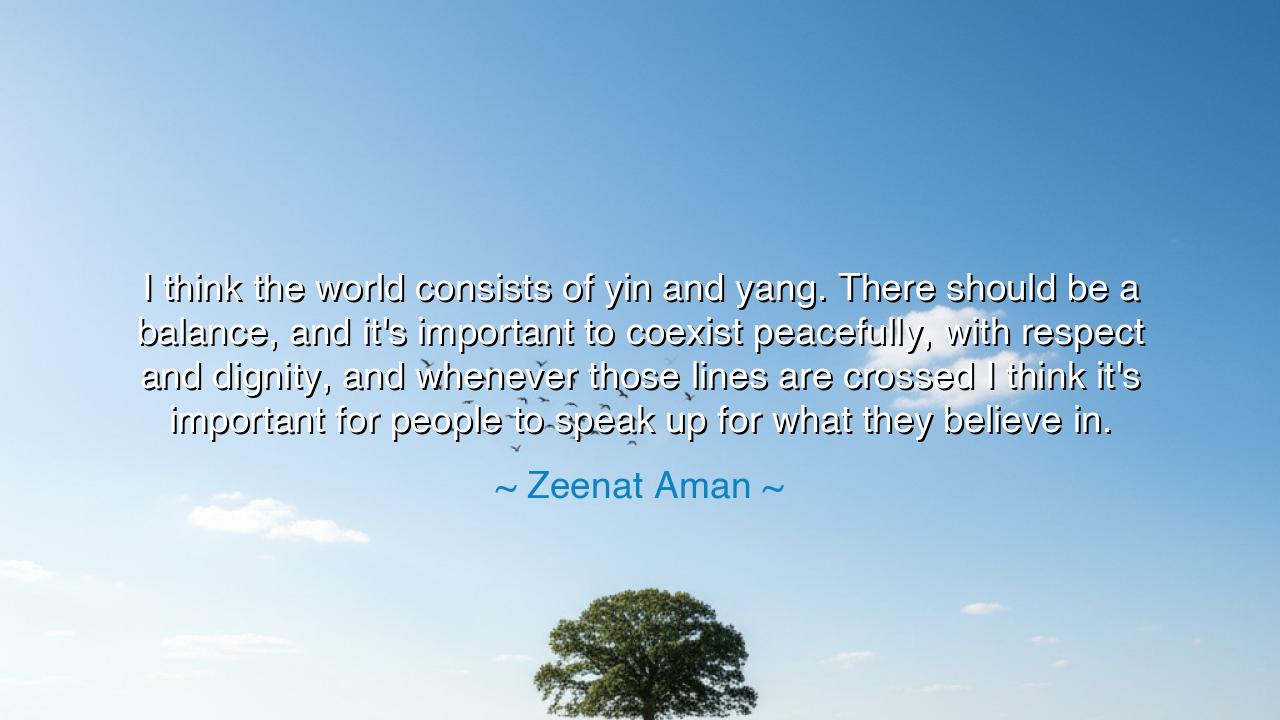
I think the world consists of yin and yang. There should be a
I think the world consists of yin and yang. There should be a balance, and it's important to coexist peacefully, with respect and dignity, and whenever those lines are crossed I think it's important for people to speak up for what they believe in.






In the words of Zeenat Aman, "I think the world consists of yin and yang. There should be a balance, and it's important to coexist peacefully, with respect and dignity, and whenever those lines are crossed I think it's important for people to speak up for what they believe in." These words carry a profound reflection on the nature of life itself. Aman speaks of the eternal duality in the world—the interplay between opposites, such as light and dark, good and evil, strength and weakness—and the importance of finding balance between them. To coexist peacefully in this world, we must embrace both the harmony of these forces and the courage to stand up for justice and truth when that balance is disturbed.
The ancients understood the idea of balance and duality at the core of their philosophical thought. In Chinese philosophy, the concept of yin and yang represents the belief that everything in life consists of two opposing forces that are interconnected and interdependent. These forces are not in conflict but complement each other, bringing about the harmony of the universe. Lao Tzu, the great sage of Daoism, spoke of the importance of embracing both the light and dark aspects of life to achieve true wisdom. His teachings encourage us to recognize that life cannot exist without balance—that peace and harmony arise not from the absence of conflict, but from the wise understanding and respectful coexistence of these opposing forces. Aman’s words reflect this ancient truth: the world is not simply about light or dark, but about finding the balance between them.
Consider the life of Socrates, whose pursuit of wisdom involved not just seeking truth but understanding the balance between knowledge and ignorance. Socrates believed that the wise person acknowledges their limitations, and through humility, finds a harmonious relationship between knowledge and ignorance, virtue and vice. But he also understood the importance of speaking out against injustice. When Socrates was unjustly condemned to death, he did not bow to the societal pressures of his time. Instead, he stood firm, speaking out for what he believed was the truth, even when it meant challenging the laws of his society. Aman's call to speak up for what you believe in is echoed in Socrates' courage to voice his truths, regardless of the consequences.
The story of Mahatma Gandhi, the leader of India’s independence movement, also reflects the wisdom of balance and speaking out for justice. Gandhi's philosophy of ahimsa (non-violence) was rooted in the understanding that true balance could only be achieved through peaceful resistance and a commitment to truth. He believed that even in the face of oppression, it was essential to maintain dignity and respect for all, including one’s adversaries. Gandhi's strength lay in his ability to resist the forces of oppression with compassion, always seeking to restore balance in the world. Like Aman, he emphasized the need to speak up when one's values were being challenged, yet he did so with a spirit of peace and respect for the opposing force.
Aman's words about balance and speaking up also remind us of Aristotle’s concept of the Golden Mean, the idea that virtue lies between extremes. Aristotle taught that balance is essential in life, and that extremes, whether in thought, action, or emotion, lead to imbalance and destruction. For Aristotle, the path of virtue was not in seeking an idealistic world of perfect harmony, but in understanding and navigating the tensions of life with wisdom. Similarly, Aman suggests that we must navigate the world with balance, acknowledging the duality of existence, but ensuring that when the lines are crossed, we stand for what is right and just, without compromising our own integrity or the peace we seek.
The lesson from Aman’s reflection is one of wisdom and courage—to recognize that the world is full of contradictions and opposing forces, but we must find a way to live harmoniously within it. At the same time, we must never be afraid to speak out when the balance is disrupted, when respect and dignity are threatened. Like the ancients, who believed that the wise person strikes a balance between self-control and action, Aman calls us to live with integrity, always seeking peace but never compromising on what is right.
In our own lives, we can follow this teaching by cultivating balance in our actions and thoughts, always striving to act in harmony with the world around us. When we encounter injustice or imbalances, we must not remain silent but must find the courage to speak up for the truth, just as Socrates, Gandhi, and Aman have taught us. Whether in our personal relationships, our communities, or our broader society, let us be vigilant in ensuring that we honor the values of respect, kindness, and dignity, and speak out whenever those principles are threatened. In doing so, we can move toward a world where the yin and yang of existence are not in conflict, but are working together to create harmony and balance for all.






AAdministratorAdministrator
Welcome, honored guests. Please leave a comment, we will respond soon